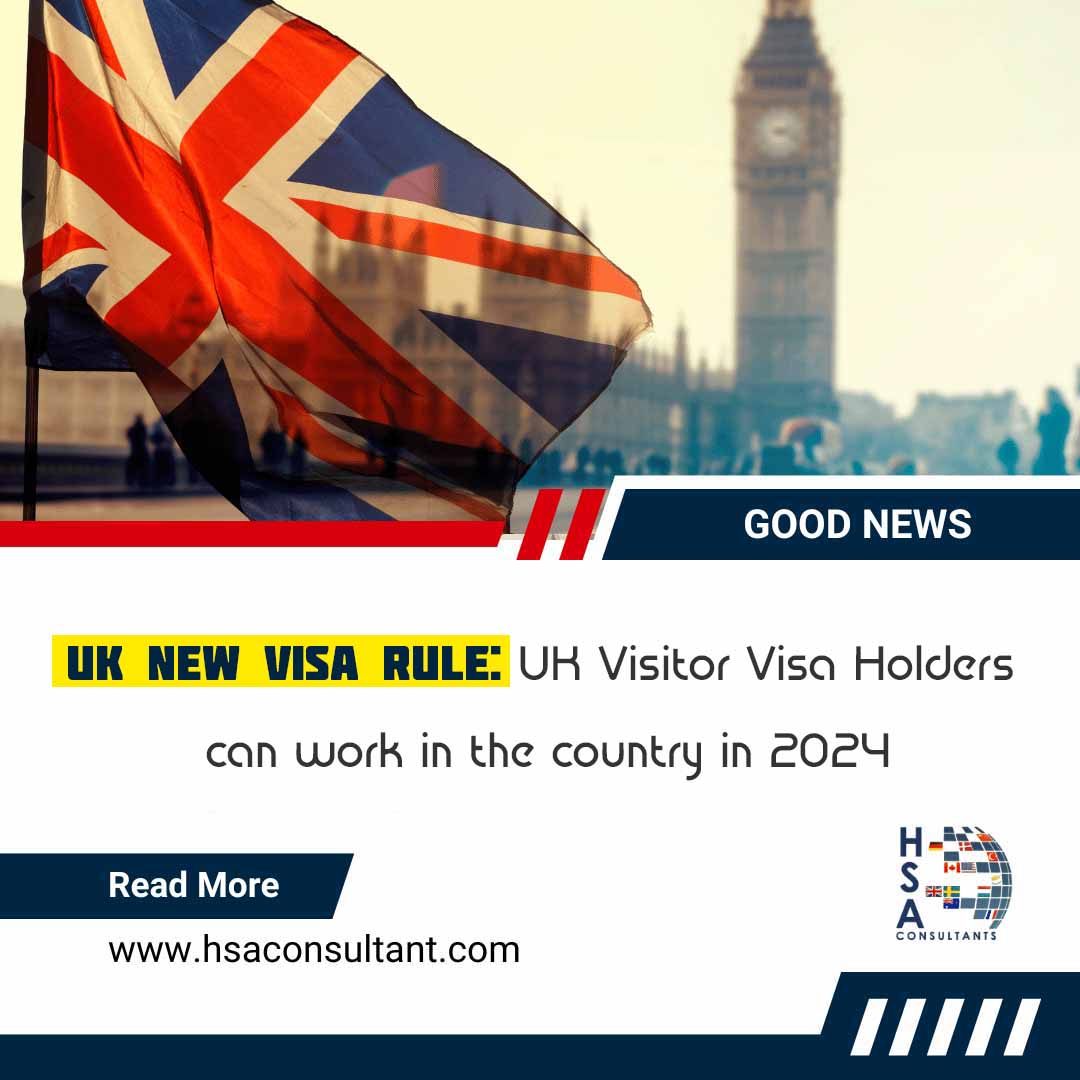The immigration landscape of the United Kingdom is ever-evolving to adapt to new requirements and address emerging issues. The UK government has announced a new visa policy that will allow visitor visa holders to apply for a work permit in 2024 to engage in work-related activities with clients and undertake remote work while visiting the UK. It is a significant change from the current rules, which require tourists to leave the country and apply for a different visa category like a Skilled Worker Visa, Graduate visa, or other work visa if they want to work in the UK.
A UK Standard Visitor Visa allows an applicant to stay in the UK for a maximum of 180 days per visit. It is a Multiple Entry visa, and it maintains its validity for about six months after you enter the UK. Nonetheless, the precise length of your stay is determined by the UK immigration officer after considering your visit’s intent and your situation. Previously, visitor visa holders were not allowed to work during their stay, and there were hurdles to gaining monetary benefits for your services.
The amendments to the tourist visa rules introduced in December 2023 will bring crucial shifts in facilitating business and research activities and adapting to contemporary work trends. It will provide a considerable boost to both business and tourism within the country and will attract more skilled workers and entrepreneurs to the UK. In this article, we will look into the fundamental rule changes and explore their impact on business visitors, prospective visitors, legal professionals, and the UK economy.
Fundamental Changes in the Visitor Visa Rules
The key changes with respect to the Immigration Rules for Visitors that are being introduced are as follows:
- Intra-Corporate Activities
Employees of companies with branches in both the UK and internationally can engage in client work abroad, provided it constitutes a small portion of their overseas responsibilities. It is crucial for a project or service by their UK branch and is not directly delivered to a UK client by the overseas employer.
Individuals employed abroad who visit a group business in the UK will now be allowed to carry out the following activities directly with clients:
- Advising and consulting
- Troubleshooting
- Providing training
- Sharing skills and knowledge
The activities must be undertaken to deliver a project or service on behalf of the UK group business (not the business abroad). They must be incidental to the person’s employment abroad. Intra-corporate activities should be of a short duration, linked to a specific project, and not involve you directly working with or for clients. The Home Office will expect you to be mainly based at your company’s offices in the UK and not at client sites unless it is for meetings.
- Remote Working Permission:
Visitors will now be permitted to work remotely while in the UK, but the primary purpose of their stay should not be remote work. This change reflects the growing trend toward flexible work arrangements and acknowledges the importance of adaptability in the modern workplace. Visitors can work remotely for their overseas employer in the UK. It means you can now attend
- Virtual meetings,
- Respond to work emails
- Answering phone calls
- Complete tasks related to your job abroad.
Currently, changes to the immigration rules state that visitors are permitted to undertake activities’ relating to’ their overseas employment, like answering work phone calls or responding to emails.
- Aviation Industry:
Flight crew members will be allowed to come to the UK between March and October as part of a Civil Aviation Authority-approved wet lease arrangement. This adjustment formalizes an existing concession outside the rules, bringing it into the visitor rules.
- Enhanced Opportunities for Scientists, Researchers, and Academics:
Scientists, researchers, and academics will have expanded opportunities to conduct research in the UK during their visit. Previously limited to independent research, scientists and researchers, as well as academics, will now be permitted to engage in research activities beyond their intended purposes. Notably, these changes do not apply to academics applying for a 12-month visit visa or those seeking to extend their permission from within the UK.
- Legal Professionals:
The scope of permitted activities for legal professionals is being expanded, offering them greater flexibility during their visits to the UK. Lawyers will be allowed to engage in additional activities, such as providing advice, acting as expert witnesses, participating in legal proceedings, and teaching.
Currently, overseas lawyers are only allowed to advise a UK-based client on specific international litigation and an international transaction. Under the new rules, allowed activities for overseas lawyers are significantly expanded, including:
- Providing advice
- Appearing in arbitrations
- Acting as an arbitrator or mediator
- Acting as an expert witness
- Appearing in court in jurisdictions that allow short-term calls or where qualified in that jurisdiction
- Conferences, teaching
- Providing advocacy for a court or tribunal hearing
- Litigation
- Transactional legal services, including drafting contracts
The requirement for the services to be for a UK-based client has been dropped. It is a substantial change that recognizes the complexity of the client parties and practices often involved in legal work.
- Paid Engagements for Conference Speakers:
Conference speakers will now be able to be remunerated for their participation, as the speakers are being included in the list of Permitted Paid Engagements (PPE). This change acknowledges the valuable contributions of speakers and ensures fair compensation for their time and expertise.
The provisions of the Permitted Paid Engagement Visitor route are being merged into the Standard Visitor route. It means that all visitors, without the need for a special visa, will be able to undertake Permitted Paid Engagements. The integration of this visa route with the standard visitor route also means that individuals who need to come to the UK for PPE purposes may enter the UK for six months instead of one. However, there are some requirements they must fulfill. These requirements are
- Individuals intending to participate in PPE must have arranged their activities before travelling to the UK and complete them within 30 days of arrival.
- Individuals intending to carry out PPE must be over the age of 18 on the date they arrive in the UK.
Expanded Professional Activities
Professionals visiting on a tourist visa to engage with the business world have more leeway now. They can:
- Attend conferences, seminars, and training.
- Give presentations or talks.
- Conduct research or fact-finding.
- Meet with clients or potential business partners. Imagine delivering a key presentation in a high-tech London conference room – this is now possible under the new visa rules.
Key Compliance Points
What You Can’t Do: It’s crucial to remember:
- No payment or remuneration from a UK source is allowed.
- You cannot actively seek or apply for jobs in the UK.
- Compliance with all visa terms, including the stay duration, is mandatory.
These changes will become effective on January 31, 2024
Requirements for the Visitor Rules
According to the official announcement, tourist visa holders who wish to work in the UK will have to meet specific criteria, such as
- A valid passport
- Purpose of visit
- Must leave UK at the end of your visit
- Proof of Residence
- Have enough funds to support yourself during your trip
- Have a job offer from a UK employer
- Have relevant qualifications and experience
- Pay a fee
- Undergo a security check
The work permit will be valid for up to two years, with the possibility of extension or switching to another visa category.
The new visa policy will come into effect on January 1, 2024. Tourist visa holders who are already in the UK before that date will be able to apply for a work permit under the new rules. However, they will be able to start working once their application is approved.
Benefits of Rule changes
The benefits of this policy are manifold.
- For tourists: It will offer them an opportunity to work and live in the UK without having to go through a complicated and costly visa process.
- For employers: It will provide them with access to a more assorted and extensive pool of talent that can fill the skills gaps in their industries.
- For the UK: It will enhance its reputation as a global leader in innovation and creativity and foster stronger ties with other countries.
In conclusion, the new visa policy is a bold and progressive move by the UK government that will benefit both tourists and British workers. It will also contribute to the economic and social development of the country in the post-Brexit era.
How to Comply with New Rules Visit Visa Rules
To effectively comply with the 2024 UK visit visa rules, individuals should:
- Identify Relevant Changes: Understand which specific rule changes apply to the purpose of the visit, whether it’s for business, tourism, or academic research.
- Activity Alignment: Ensure that planned activities in the UK align with the updated visa guidelines, especially in areas like remote working, intra-corporate projects, and legal services.
- Document Preparation: Compile and prepare documentation that substantiates the visit’s purpose and demonstrates compliance with the new rules. It may include employment letters, invitations for conferences, or proof of ongoing projects abroad.
Conclusion
In conclusion, the UK’s new visa rule set to commence in 2024 is a significant move that will positively influence both the country’s economy and international relations. This development will provide visitor visa holders with a unique opportunity to gain work experience in one of the world’s leading economies. It is expected to attract more skilled individuals globally and significantly boost the UK’s labor market. Interested individuals should start preparing now for this exciting opportunity, ensuring they meet any specific requirements that the government may lay out. Don’t miss your chance to seize this golden opportunity – start planning your move to the UK today!



